It looks like you have a corrupt date value in your table.
With valid dates you wouldn't see this:
alter session set nls_date_format = 'DD-MON-YYYY HH24:MI:SS';
select start_date,
to_char(start_date, 'DD-MON-YYYY HH24:MI:SS') as str,
dump(start_date, 16) as dmp
from your_table;
| START_DATE |
STR |
DMP |
| 11-AUG-2000 00:00:00 |
11-AUG-2000 00:00:00 |
Typ=12 Len=7: 78,64,8,b,1,1,1 |
| 15-NOV-2008 00:40:04 |
15-NOV-2008 00:40:04 |
Typ=12 Len=7: 78,6c,b,f,1,29,5 |
| 15-NOV-2008 00:19:56 |
15-NOV-2008 00:19:56 |
Typ=12 Len=7: 78,6c,b,f,1,14,39 |
| 29-APR-2016 23:42:02 |
29-APR-2016 23:42:02 |
Typ=12 Len=7: 78,74,4,1d,18,2b,3 |
But if I corrupt the binary value stored for the third value, which can be done with a manipulated hex value:
declare
d date;
begin
dbms_stats.convert_raw_value('786c0b0f0115fd', d);
update your_table set start_date = d
where start_date = cast(timestamp '2008-11-15 00:19:56' as date);
end;
/
... then now the stored value looks OK at first glance, even when formatted as a string using the session NLS setting; but formatting explicitly - even with the same format string - shows zeros for all of the elements:
select start_date,
to_char(start_date, 'DD-MON-YYYY HH24:MI:SS') as str,
dump(start_date, 16) as dmp
from your_table;
| START_DATE |
STR |
DMP |
| 11-AUG-2000 00:00:00 |
11-AUG-2000 00:00:00 |
Typ=12 Len=7: 78,64,8,b,1,1,1 |
| 15-NOV-2008 00:40:04 |
15-NOV-2008 00:40:04 |
Typ=12 Len=7: 78,6c,b,f,1,29,5 |
| 15-NOV-2008 00:20:04 |
00-000-0000 00:00:00 |
Typ=12 Len=7: 78,6c,b,f,1,15,fd |
| 29-APR-2016 23:42:02 |
29-APR-2016 23:42:02 |
Typ=12 Len=7: 78,74,4,1d,18,2b,3 |
fiddle
Your actual dump value might be different of course, I just found one that gave the same apparent value you see.
The explicitly-formatted string version of that corrupted value comes out as 00-000-0000 00:00:00, which is what you are seeing, though you're looking at individual elements. (Interesting that even the month abbreviation is 000 here... And extract() still gives the expected year/month/day numbers, at least with this specific corruption, but might not with yours.)
Some clients might balk at showing it at all, which I suspect is why you see nothing in Toad.
Unless you know how the corruption occurred - which could be from a malformed OCI call, or I seem to recall that legacy imp used to have a bug that could do this - and what the value actually should be you might not be able to correct it properly.
The best you might be able to do is replace it with a valid version of the same apparent date/time by updating that row. But you have no way of knowing if the value is even close to what was intended - I changed the minute and seconds slightly, your corruption could be much worse, and it could be very hard to tell. (Some values might be off slightly, some wildly, some negative...)
